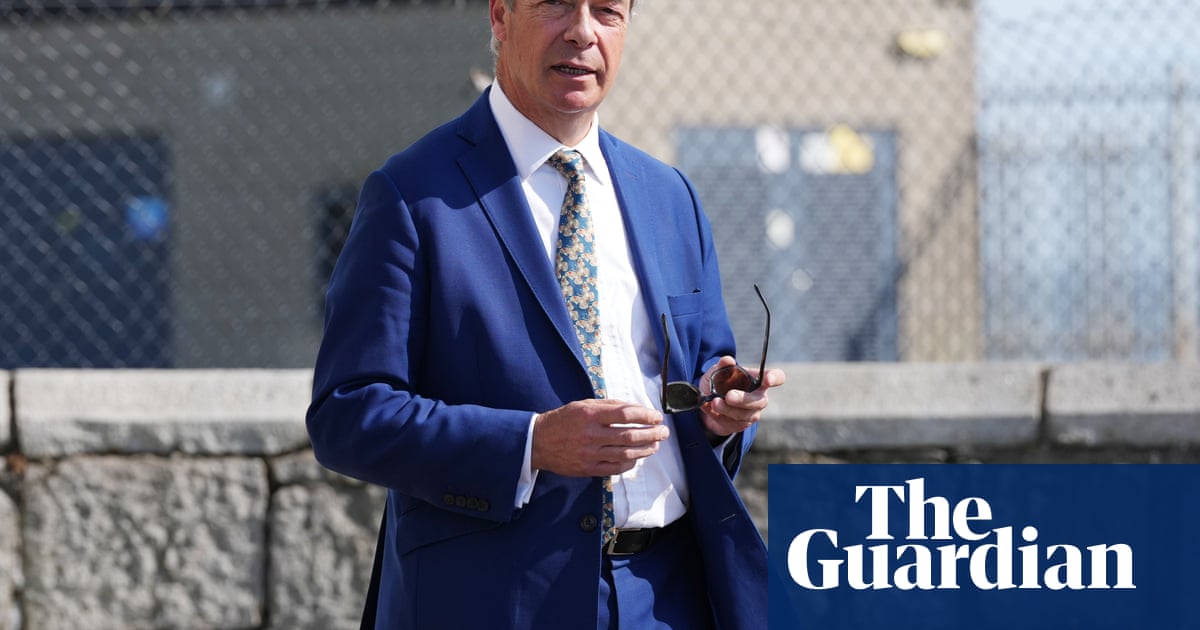Nigel Farage has claimed a Scottish Labour councillor has defected to Reform UK on the eve of a pivotal Holyrood byelection, as he defended a controversial advert attacking Anas Sarwar that has promptedaccusations of racism.
The Reform leader said he would disclose the councillor’s identity when he campaigned in the Hamilton, Larkhall and Stonehouse byelection later on Monday, with opinion polls suggesting Reform and Labour are neck-and-neck inScotland, albeit behind the Scottish National party.
Farage did not name the councillor but ScottishLaboursources were sceptical, and speculated whether it could be someone who had already quit the party to sit as an independent.
Speaking as he unveiled another Scottish Conservative defector to Reform in Aberdeen – a local councillor called Duncan Massey – Farage played down the prospects of Reform delivering a shock win in Hamilton, despite its surge in England.
“We just don’t know,” he said, at a press conference at the Silver Darling fish restaurant overlooking the mouth to Aberdeen harbour. “Are we confident of coming third? Yes. Are we confident of coming second? Well, I don’t know. If we do, it’ll be a very nice surprise.
“Do I realistically think we can win? Well, if we do, then that will be the biggest earthquakeScottish politicshas probably ever seen. You never know. On a low turnout election with a disenchanted electorate, I guess it’s not impossible, but I think it’s improbable.”
Farage said he was buoyant about Reform’s chances in Scotland. The latest opinion poll, by Norstat for the Sunday Times, has put his party one percentage point behind Scottish Labour in a Holyrood vote, at 18% and 19% respectively.
Massey is the 13th councillor in Scotland, out of a total of 1,226, to have defected to Reform. The party has yet to win a single council or parliamentary seat in Scotland, but did come second ahead of Labour in a recent council byelection.
Farage said he was justified in calling Sarwar, the Scottish Labour leader, “sectarian” after Reform circulated a video of Sarwar praising the successes of Pakistanis in public life.
With anti-Reform protesters loudly chanting outside, Farage claimed Sarwar meant south Asians wanted to “take over the world”, but admitted under questioning that Sarwar’s speech was to commemorate Pakistan independence day.
Sarwar, who was campaigning in Hamilton on Monday morning, said Farage’s remarks were “pathetic, poisonous and obviously deliberate misinformation”.
Farage’s focus on race was doing a disservice to voters he said, who “should be hearing a debate about how they get investment in their town centres, how we improve their NHS facilities, how we give skills and opportunities to young people”.
Farage was with his deputy leader, Richard Tice, to call for Westminster to drop the windfall levies and steeply cut taxes on North Sea oil and gas, and to drop the levies on household energy bills.
Sign up toFirst Edition
Our morning email breaks down the key stories of the day, telling you what’s happening and why it matters
after newsletter promotion
Tice claimed that with the UK’s North Sea reserves contributing only 1% of global emissions, limiting drilling and heavily taxing the sector was the “greatest act of financial self-harm ever imposed on this nation”.
Farage said the concept of net zero was misleading, since growing imports into the UK meant the country was off-shoring its carbon emissions. Instead, the UK ought to be mining Cumbrian coal to keep steel mills open, rather than importing it.
He was asked three times by the Guardian whether it was Reform policy that all the world’s oil, gas and coal reserves should be exploited, given he believed all the UK’s fossil fuels should be burned, but refused to give a direct answer.
“You know, mankind this year is going to burn 8bn tonnes of coal,” he said. “I share with you reservations about what this is doing to the atmosphere … But does it make sense to commit economic hara-kiri in this country, whilst this is happening across the rest of the world? No, better to refine in this country. Better to produce chemicals in this country. Better to manufacture cement.”
Pressed by the BBC on whether extracting all the UK’s North Sea oil and gas reserves would cut energy prices, he acknowledged they were traded globally. It would increase jobs and wealth for those firms involved, he said.
